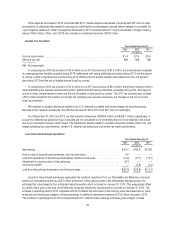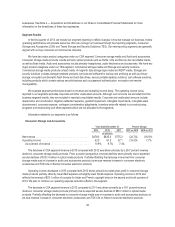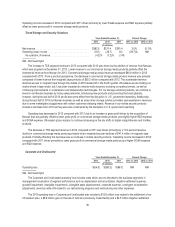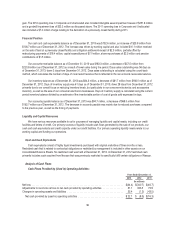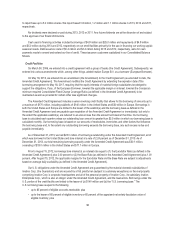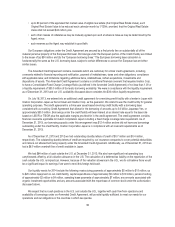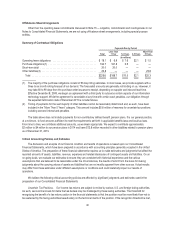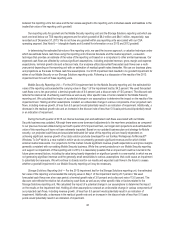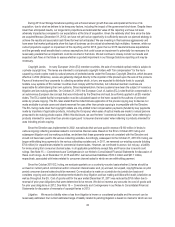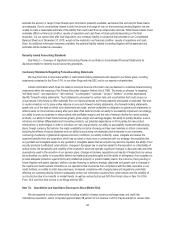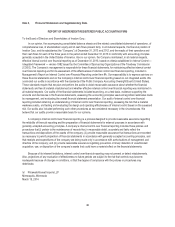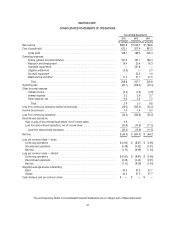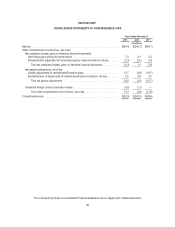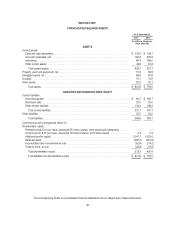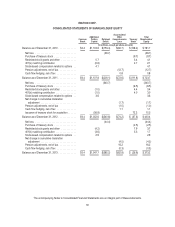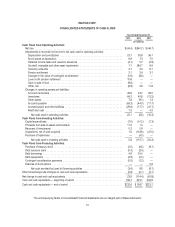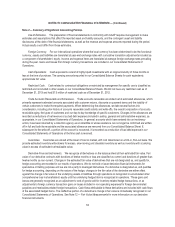Memorex 2013 Annual Report Download - page 46
Download and view the complete annual report
Please find page 46 of the 2013 Memorex annual report below. You can navigate through the pages in the report by either clicking on the pages listed below, or by using the keyword search tool below to find specific information within the annual report.During 2013 our Storage Solutions reporting unit achieved slower growth than was anticipated at the time of its
acquisition, due to what we believe to be temporary factors, including the impact of the government shut-down. Despite these
lower than anticipated results, our longer-term projections and estimated fair value of this reporting unit have not been
adversely impacted as compared to our expectations at the time of acquisition. Given the relatively short time since the date
we acquired Nexsan (December 31, 2012), we have not yet had an opportunity to sufficiently execute our planned strategy to
achieve the results and associated cash flows that we had anticipated. We are investing in this business aggressively and
have seen that market participants show this type of business can be valued at extremely high multiples. However, while our
current projections support no impairment of this reporting unit for 2013, given that our 2013 results fell below expectations
and the generally small sensitivities to various assumptions that could cause an impairment to potentially be necessary it is
reasonably possible that an impairment could be incurred in the future. We will continue to closely monitor our results and
expected cash flows in the future to assess whether a goodwill impairment in our Storage Solutions reporting unit may be
necessary.
Copyright Levies. In many European Union (EU) member countries, the sale of recordable optical media is subject to
a private copyright levy. The levies are intended to compensate copyright holders with “fair compensation” for the harm
caused by private copies made by natural persons of protected works under the European Copyright Directive, which became
effective in 2002 (Directive). Levies are generally charged directly to the importer of the product upon the sale of the products.
Payers of levies remit levy payments to collecting societies which, in turn, are expected to distribute funds to copyright
holders. Levy systems of EU member countries must comply with the Directive, but individual member countries are
responsible for administering their own systems. Since implementation, the levy systems have been the subject of numerous
litigation and law making activities. On October 21, 2010, the European Court of Justice (ECJ) ruled that fair compensation is
an autonomous European law concept that was introduced by the Directive and must be uniformly applied in all EU member
states. The ECJ stated that fair compensation must be calculated based on the harm caused to the authors of protected
works by private copying. The ECJ also stated that the indiscriminate application of the private copying levy to devices not
made available to private users and clearly reserved for uses other than private copying is incompatible with the Directive.
The ECJ ruling made clear that copyright holders are only entitled to fair compensation payments (funded by levy payments
made by importers of applicable products, including the Company) when sales of optical media are made to natural persons
presumed to be making private copies. Within this disclosure, we use the term “commercial channel sales” when referring to
products intended for uses other than private copying and “consumer channel sales” when referring to products intended for
uses including private copying.
Since the Directive was implemented in 2002, we estimate that we have paid in excess of $100 million in levies to
various ongoing collecting societies related to commercial channel sales. Based on the ECJ’s October 2010 ruling and
subsequent litigation and law making activities, we believe that these payments were not consistent with the Directive and
should not have been paid to the various collecting societies. Accordingly, subsequent to the October 21, 2010 ECJ ruling, we
began withholding levy payments to the various collecting societies and, in 2011, we reversed our existing accruals (totaling
$7.8 million) for unpaid levies related to commercial channel sales. However, we continued to accrue, but not pay, a liability
for levies arising from consumer channel sales, in all applicable jurisdictions except Italy and France due to recent court
rulings. See Note 15 — Commitments and Contingencies in our Notes to Consolidated Financial Statements for discussion of
these court rulings. As of December 31, 2013 and 2012, we had accrued liabilities of $10.0 million and $27.7 million,
respectively, associated with levies related to consumer channel sales for which we are withholding payment.
Since the October 2010 ECJ ruling, we evaluate quarterly on a country-by-country basis whether (i) levies should be
accrued on current period commercial and/or consumer channel sales; and, (ii) accrued, but unpaid, copyright levies on prior
period consumer channel sales should be reversed. Our evaluation is made on a jurisdiction-by-jurisdiction basis and
considers ongoing and cumulative developments related to levy litigation and law making activities within each jurisdiction as
well as throughout the EU. Cost of goods sold for the year ended December 31, 2011 was reduced by $7.8 million due to
reversal of prior year obligations that were determined to be remote. We did not reverse any amounts into cost of goods sold
for prior year obligations in 2012. See Note 15 — Commitments and Contingencies in our Notes to Consolidated Financial
Statements for discussion of reversals of copyright levies in 2013.
Litigation. We record a liability when a loss from litigation is known or considered probable and the amount can be
reasonably estimated. Our current estimated range of liability related to pending litigation is based on claims for which we can
43


